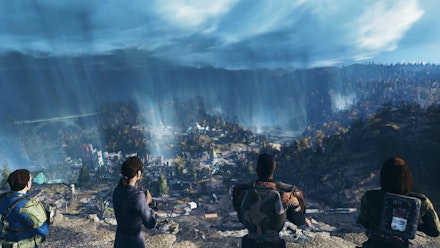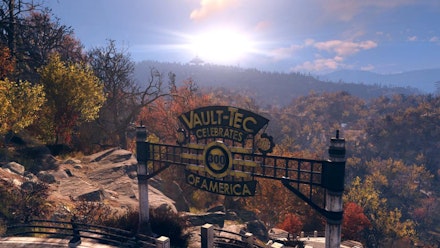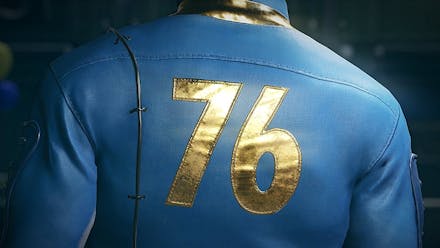Platforms: PS4, Xbox One, PC
Fallout 76 is a curious beast. Bethesda's latest trip to the post-apocalyptic wastelands of a devastated USA has mutated into a multiplayer experience, but tries to avoid being labelled 'Fallout Online'. Yet it's also no longer the epic single player RPG that fans of the series have come to love.

Sometimes, hybrids flourish, combining discrete components into something thrilling and new. Make no mistake, Fallout 76 shows glimmers of such potential – the West Virginian setting is vast and gorgeous, four times the size of Fallout 4’s world map and featuring twists on real-world locations. Its approach to character progression is one of the most versatile in the franchise's history, with countless ways to spec your character and customise skills. The sound design is similarly impressive, everything from musical score and environmental effects to abandoned audio logs and a slate of in-game radio broadcasts handsomely aiding world building.
But on closer inspection Fallout 76 looks a lot less healthy – its side-step to an online experience fundamentally undermines a lot of what made previous entries so enjoyable. The hook, such as it is, is that every other character is another player. Combat is allowed, but must be mutual – anyone going around killing others without provocation or retaliation gets significantly debuffed – while friendly co-operation is encouraged through a ring of emotes to visually communicate with.
The world feels more barren and lifeless than the radioactive wasteland it takes place in.
The trade-off is that there are no non-player characters to interact with. All quests are given from robots or terminals, or notes left behind by never-seen plot figures. The result is a world that feels more barren and lifeless than the radioactive wasteland it takes place in. There are no enclaves of survivors needing your help, no enlightened mutants wanting to forge their own communities, no factions to join or defeat. No characters; no character.
The presence of other real people also breaks a core element of Fallout’s combat. The Vault-Tec Assisted Targeting System – or V.A.T.S. – returns, but it no longer allows you to target enemy weak points in slow motion. Why? Because you can't slow down the entire game world or even an area of it when someone else may be nearby and moving at their own speed. The result is a pointless real-time version that ostensibly still lets you target specific areas but without the ability to line up your shots.
Then there are the far more demanding survival elements. Between health, hunger, thirst, radiation exposure, degrading weapons and armour, and disease, just exploring the world feels like a chore. You're constantly battling to keep on top of your needs, which is more frustrating than fun. A new C.A.M.P. system – Construction and Assembly Mobile Platform, another of Bethesda's beloved on-the-nose acronyms – lets you craft items or food on the go, but it costs in-game money to relocate it.

Money is also an issue here, with a new microtransaction storefront called the Atomic Shop selling cosmetic items alongside occasional crafting plans. The Atoms you'll need to buy these can be earned from completing in-game challenges or bought for real-world money. It's entirely optional, but it's likely to rub some players the wrong way.
Perhaps the biggest issue though is the number of players – up to 24 players will be active in each shared instance of the world at any one time. That's small enough for you to avoid entirely if you want to continue to approach the game as a solo player, but not enough to make multiplayer really interesting. The mixed bag that results won't really please those who would enjoy a proper Fallout MMO, or those who've enjoyed having the world to themselves in the past.

